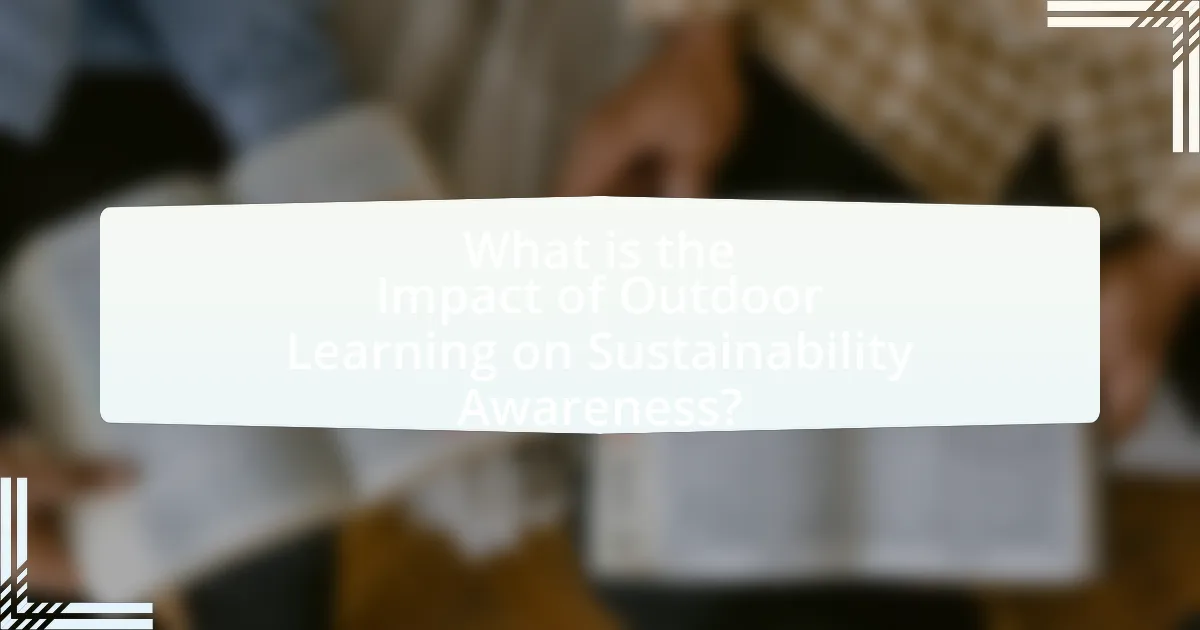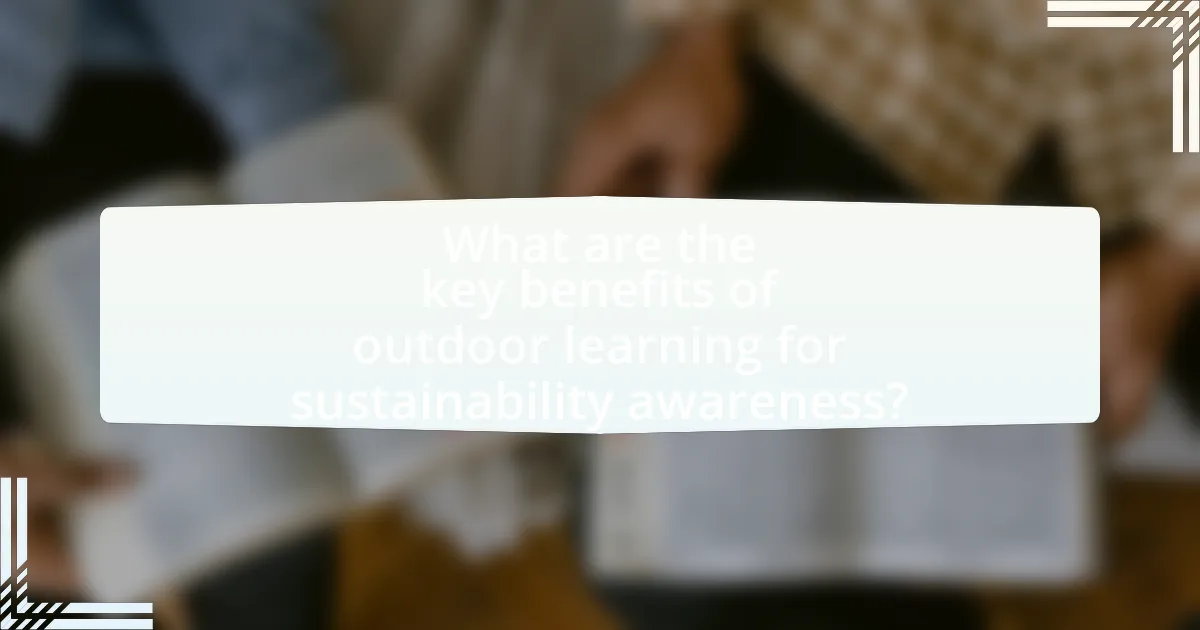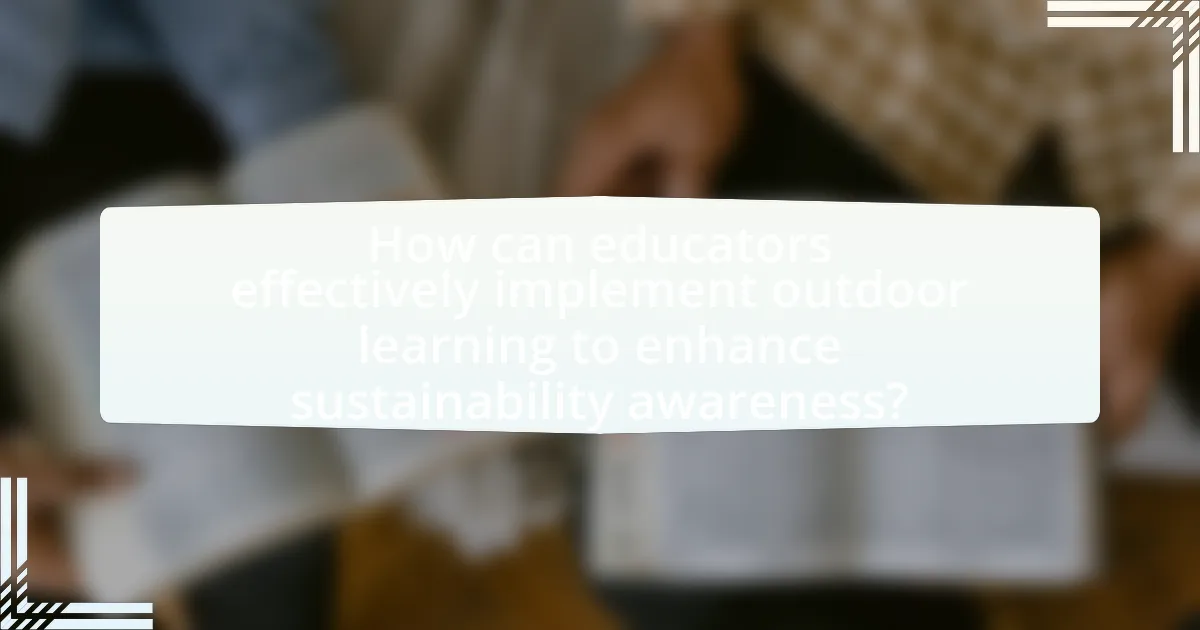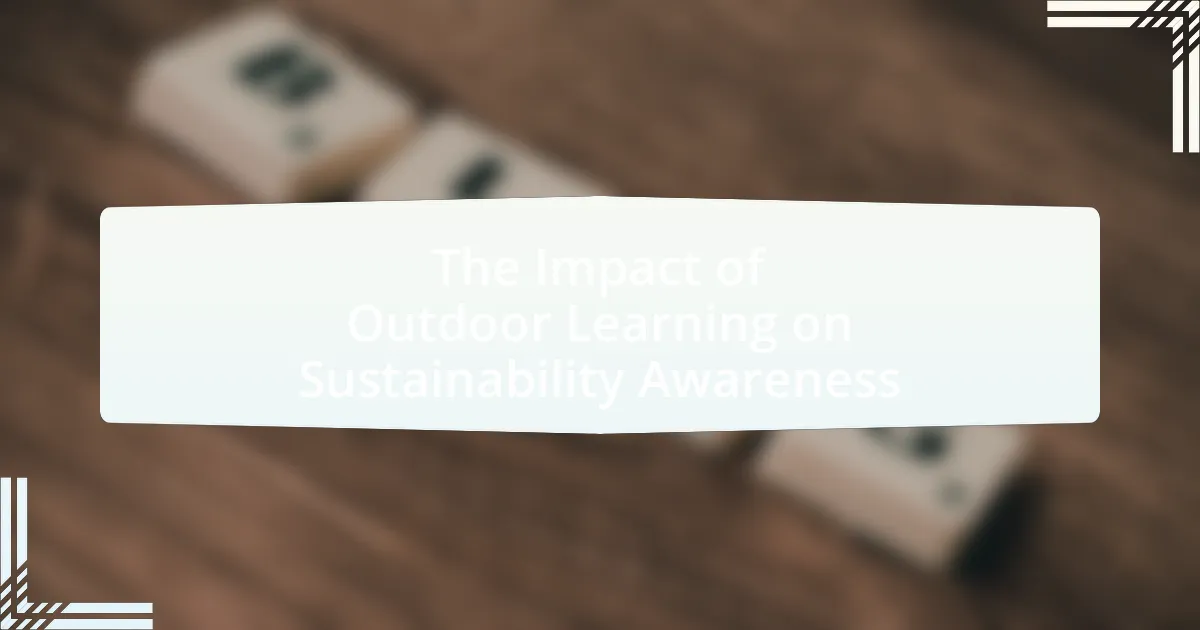The article examines the impact of outdoor learning on sustainability awareness, highlighting how experiential education fosters a deeper understanding of ecological systems and promotes pro-environmental behaviors. Research indicates that outdoor learning enhances students’ knowledge of environmental issues, encourages critical thinking, and cultivates a commitment to sustainable practices. Specific activities such as community gardening and wildlife conservation are identified as effective in increasing sustainability awareness. The article also discusses the role of education in promoting sustainable practices, the psychological benefits of nature exposure, and strategies for educators to implement outdoor learning effectively.

What is the Impact of Outdoor Learning on Sustainability Awareness?
Outdoor learning significantly enhances sustainability awareness by providing experiential education that connects individuals with their natural environment. Research indicates that outdoor learning experiences foster a deeper understanding of ecological systems and promote pro-environmental behaviors. For instance, a study published in the Journal of Environmental Education found that students who participated in outdoor learning programs demonstrated increased knowledge of environmental issues and a greater commitment to sustainable practices. This direct engagement with nature not only cultivates appreciation but also encourages critical thinking about sustainability challenges, leading to more informed and responsible decision-making regarding environmental stewardship.
How does outdoor learning influence students’ understanding of sustainability?
Outdoor learning significantly enhances students’ understanding of sustainability by providing experiential learning opportunities that connect theoretical concepts to real-world applications. Engaging with nature allows students to observe ecological systems firsthand, fostering a deeper appreciation for environmental interdependence and the impact of human activities on ecosystems. Research conducted by the University of Illinois found that students who participated in outdoor education programs demonstrated increased environmental knowledge and a greater likelihood of adopting sustainable behaviors, such as recycling and conservation efforts. This direct interaction with the environment reinforces the importance of sustainability, making it more relevant and tangible for students.
What specific outdoor activities enhance sustainability awareness?
Specific outdoor activities that enhance sustainability awareness include community gardening, nature walks, and wildlife conservation projects. Community gardening fosters an understanding of local ecosystems and food production, while nature walks promote appreciation for biodiversity and the importance of preserving natural habitats. Wildlife conservation projects engage participants in hands-on efforts to protect endangered species, highlighting the interconnectedness of all living organisms. Research indicates that experiential learning through these activities significantly increases environmental knowledge and pro-sustainability behaviors among participants.
How does experiential learning in nature differ from traditional classroom learning?
Experiential learning in nature differs from traditional classroom learning primarily in its emphasis on direct engagement with the environment, fostering a hands-on, immersive experience. In nature-based learning, students actively participate in activities such as hiking, gardening, or wildlife observation, which enhances their understanding of ecological systems and sustainability practices. Research indicates that outdoor learning can significantly improve students’ environmental awareness and attitudes; for instance, a study published in the Journal of Environmental Education Research found that students who engaged in outdoor experiential learning demonstrated a 30% increase in their knowledge of sustainability concepts compared to those in traditional classroom settings. This direct interaction with nature not only promotes critical thinking and problem-solving skills but also cultivates a deeper emotional connection to the environment, which is often lacking in conventional educational approaches.
Why is sustainability awareness important in education?
Sustainability awareness is important in education because it equips students with the knowledge and skills necessary to address environmental challenges. By integrating sustainability into educational curricula, students learn the significance of ecological balance, resource conservation, and social responsibility. Research indicates that educational programs focused on sustainability can lead to increased environmental literacy, which is essential for fostering responsible citizenship and informed decision-making. For instance, a study by the National Environmental Education Foundation found that students who participated in sustainability-focused education demonstrated a 50% increase in their understanding of environmental issues compared to those who did not. This highlights the critical role of sustainability awareness in shaping future generations capable of making sustainable choices.
What role does education play in promoting sustainable practices?
Education plays a crucial role in promoting sustainable practices by equipping individuals with the knowledge and skills necessary to understand environmental issues and make informed decisions. Through curricula that emphasize sustainability, students learn about ecological systems, resource management, and the impact of human activities on the planet. Research indicates that educational programs focused on sustainability can lead to increased awareness and behavioral changes; for instance, a study published in the Journal of Environmental Education found that students who participated in sustainability-focused education were more likely to engage in eco-friendly behaviors, such as recycling and conservation efforts. This demonstrates that education not only informs but also empowers individuals to adopt sustainable practices in their daily lives.
How can increased sustainability awareness affect future generations?
Increased sustainability awareness can lead future generations to adopt environmentally responsible behaviors and practices. This shift in mindset encourages individuals to prioritize conservation, reduce waste, and support sustainable technologies. Research indicates that educational initiatives focused on sustainability, such as outdoor learning experiences, significantly enhance students’ understanding of ecological principles and their role in environmental stewardship. For instance, a study published in the Journal of Environmental Education Research found that students who participated in outdoor learning programs demonstrated a 30% increase in their knowledge of sustainability concepts compared to those who did not. This foundational knowledge equips future generations to make informed decisions that positively impact the environment, fostering a culture of sustainability that can mitigate climate change and preserve natural resources for years to come.

What are the key benefits of outdoor learning for sustainability awareness?
Outdoor learning significantly enhances sustainability awareness by providing experiential education that connects individuals with their environment. This hands-on approach fosters a deeper understanding of ecological systems and the importance of conservation. Research indicates that students engaged in outdoor learning demonstrate increased environmental stewardship, as evidenced by a study published in the Journal of Environmental Education, which found that 75% of participants reported a greater commitment to sustainable practices after outdoor experiences. Additionally, outdoor learning encourages critical thinking and problem-solving skills related to environmental issues, further solidifying the connection between education and sustainable behavior.
How does outdoor learning foster a connection to the environment?
Outdoor learning fosters a connection to the environment by immersing individuals in natural settings, which enhances their understanding and appreciation of ecological systems. Engaging with nature through hands-on experiences, such as observing wildlife or participating in conservation activities, allows learners to develop a personal relationship with their surroundings. Research indicates that outdoor education programs significantly increase environmental awareness and stewardship among participants, as evidenced by a study conducted by the University of Minnesota, which found that students who participated in outdoor learning reported a greater sense of responsibility towards environmental conservation.
What psychological effects does nature exposure have on students?
Nature exposure has positive psychological effects on students, including reduced stress, improved mood, and enhanced cognitive function. Studies indicate that spending time in natural environments can lower cortisol levels, which are associated with stress, and increase feelings of well-being. For instance, research published in the journal “Environmental Science & Technology” by Bratman et al. (2015) found that participants who walked in a natural setting reported lower levels of rumination and improved mood compared to those who walked in an urban environment. Additionally, exposure to nature has been linked to better attention and memory, as evidenced by a study in “Psychological Science” by Berman et al. (2008), which demonstrated that nature experiences can enhance cognitive performance.
How does outdoor learning promote critical thinking about environmental issues?
Outdoor learning promotes critical thinking about environmental issues by immersing learners in real-world contexts where they can observe and analyze ecological systems directly. This experiential approach encourages students to engage with their surroundings, fostering inquiry-based learning that challenges preconceived notions and stimulates problem-solving skills. Research indicates that outdoor education enhances cognitive development, as students are more likely to ask questions, explore solutions, and reflect on their experiences when interacting with nature. For instance, a study published in the Journal of Environmental Education Research found that students participating in outdoor learning programs demonstrated improved critical thinking skills and a deeper understanding of environmental concepts compared to those in traditional classroom settings.
What skills do students develop through outdoor learning related to sustainability?
Students develop critical thinking, problem-solving, teamwork, and environmental stewardship skills through outdoor learning related to sustainability. Engaging in hands-on activities in natural settings encourages students to analyze ecological systems, make informed decisions about resource use, and collaborate effectively with peers. Research indicates that outdoor learning experiences enhance students’ understanding of environmental issues, as demonstrated in a study by the University of Minnesota, which found that students participating in outdoor education programs showed a 30% increase in their ability to apply sustainability concepts in real-world scenarios.
Which practical skills are enhanced by outdoor learning experiences?
Outdoor learning experiences enhance practical skills such as teamwork, problem-solving, and critical thinking. These skills are developed through collaborative activities that require participants to work together to overcome challenges in a natural environment. For instance, studies have shown that outdoor education programs significantly improve students’ ability to communicate effectively and make decisions as a group, which are essential components of teamwork. Additionally, engaging with real-world scenarios in outdoor settings fosters critical thinking as learners assess situations, evaluate options, and implement solutions. Research conducted by the University of Minnesota highlights that students who participate in outdoor learning demonstrate increased confidence in their problem-solving abilities, further validating the impact of these experiences on practical skill enhancement.
How do these skills contribute to sustainable living practices?
Skills acquired through outdoor learning, such as critical thinking, problem-solving, and environmental stewardship, significantly contribute to sustainable living practices. These skills enable individuals to assess environmental challenges, make informed decisions, and implement sustainable solutions in their daily lives. For instance, studies show that outdoor education fosters a deeper understanding of ecological systems, leading to increased awareness of resource conservation and waste reduction. This connection between knowledge and behavior is supported by research indicating that individuals engaged in outdoor learning are more likely to adopt eco-friendly practices, such as recycling and sustainable consumption.

How can educators effectively implement outdoor learning to enhance sustainability awareness?
Educators can effectively implement outdoor learning to enhance sustainability awareness by integrating hands-on, experiential activities that connect students with their natural environment. This approach allows students to observe ecological systems, engage in conservation projects, and understand the impact of human activities on the environment. Research indicates that outdoor learning experiences significantly improve students’ environmental attitudes and behaviors, as evidenced by a study published in the Journal of Environmental Education, which found that students participating in outdoor education programs demonstrated a 30% increase in sustainability knowledge and a 25% increase in pro-environmental behaviors. By utilizing local ecosystems as classrooms, educators can foster a deeper appreciation for nature and promote sustainable practices among students.
What strategies can teachers use to integrate outdoor learning into their curriculum?
Teachers can integrate outdoor learning into their curriculum by implementing place-based education, which connects students to their local environment and community. This strategy encourages hands-on experiences, such as field trips to parks, nature reserves, or local farms, where students can engage in activities like planting trees or conducting ecological surveys. Research indicates that outdoor learning enhances student engagement and fosters a deeper understanding of environmental issues, as evidenced by a study published in the Journal of Environmental Education, which found that students participating in outdoor programs showed a 30% increase in environmental awareness compared to traditional classroom settings. Additionally, incorporating outdoor lessons into subjects like science, art, and physical education allows for interdisciplinary learning, making the curriculum more relevant and impactful.
What resources are available for educators to facilitate outdoor learning?
Educators can access various resources to facilitate outdoor learning, including curriculum guides, training programs, and community partnerships. Curriculum guides, such as those provided by organizations like the North American Association for Environmental Education, offer structured activities and lesson plans that integrate outdoor experiences with educational standards. Training programs, such as those from the Outdoor Classroom Project, equip educators with skills to effectively teach in outdoor settings. Additionally, partnerships with local environmental organizations can provide educators with access to expert knowledge, field trips, and hands-on activities that enhance outdoor learning experiences. These resources collectively support the integration of outdoor learning into educational practices, promoting sustainability awareness among students.
How can schools measure the impact of outdoor learning on sustainability awareness?
Schools can measure the impact of outdoor learning on sustainability awareness through pre- and post-program surveys that assess students’ knowledge and attitudes towards sustainability. These surveys can include specific questions about environmental concepts, personal behaviors related to sustainability, and the perceived importance of environmental stewardship. Research indicates that outdoor learning experiences significantly enhance students’ understanding of ecological principles; for instance, a study by Rickinson et al. (2004) found that outdoor education programs led to increased environmental awareness and positive behavioral changes in students. Additionally, schools can track changes in students’ participation in sustainability initiatives, such as recycling programs or conservation projects, to further quantify the impact of outdoor learning on their awareness and actions regarding sustainability.
What challenges might educators face when implementing outdoor learning?
Educators may face several challenges when implementing outdoor learning, including logistical issues, safety concerns, and curriculum alignment. Logistical issues arise from the need for adequate planning, transportation, and access to suitable outdoor spaces, which can be limited in urban environments. Safety concerns involve managing risks associated with outdoor activities, such as weather conditions, terrain hazards, and student supervision. Additionally, aligning outdoor learning experiences with existing curriculum standards can be difficult, as educators must ensure that outdoor activities meet educational objectives while also engaging students effectively. These challenges can hinder the successful integration of outdoor learning into educational practices.
How can schools overcome logistical barriers to outdoor learning?
Schools can overcome logistical barriers to outdoor learning by establishing partnerships with local organizations and utilizing community resources. Collaborating with parks, nature centers, and environmental organizations can provide access to outdoor spaces and educational materials, reducing the need for extensive transportation and planning. For instance, a study by the National Park Service found that schools that partnered with local parks reported a 30% increase in outdoor learning opportunities, demonstrating the effectiveness of community collaboration. Additionally, schools can implement flexible scheduling to allow for outdoor activities during optimal weather conditions, further facilitating outdoor learning experiences.
What safety considerations should be taken into account during outdoor activities?
Safety considerations during outdoor activities include assessing environmental conditions, using appropriate gear, and being aware of wildlife hazards. Environmental conditions such as weather, terrain, and potential natural hazards like floods or landslides must be evaluated to ensure participant safety. Appropriate gear, including helmets, first aid kits, and weather-appropriate clothing, is essential to mitigate risks. Awareness of wildlife hazards, such as snakes or bears, is crucial for preventing dangerous encounters. According to the National Park Service, over 2 million visitors experience injuries annually due to inadequate safety measures during outdoor activities, highlighting the importance of these considerations.
What are some best practices for maximizing the impact of outdoor learning on sustainability awareness?
To maximize the impact of outdoor learning on sustainability awareness, educators should integrate hands-on, experiential activities that connect students directly with their environment. Engaging students in activities such as community gardening, wildlife observation, and local ecosystem studies fosters a personal connection to nature, which research shows enhances environmental stewardship. A study by the National Environmental Education Foundation found that students who participate in outdoor learning experiences demonstrate increased knowledge of environmental issues and a greater likelihood of adopting sustainable behaviors. Additionally, incorporating reflective practices, such as journaling or group discussions, allows students to process their experiences and solidify their understanding of sustainability concepts.
How can collaboration with local organizations enhance outdoor learning experiences?
Collaboration with local organizations enhances outdoor learning experiences by providing access to resources, expertise, and community engagement. Local organizations often possess specialized knowledge about the environment, sustainability practices, and cultural heritage, which can enrich the educational content delivered during outdoor activities. For instance, partnerships with environmental nonprofits can facilitate hands-on conservation projects, allowing learners to apply theoretical knowledge in real-world contexts. Research indicates that experiential learning, such as that provided through these collaborations, significantly increases retention of information and fosters a deeper understanding of sustainability issues. A study by the National Park Service found that students participating in outdoor learning programs that involved local organizations demonstrated a 30% increase in environmental stewardship behaviors compared to those who did not engage with such partnerships.
What role do parents and the community play in supporting outdoor learning initiatives?
Parents and the community play a crucial role in supporting outdoor learning initiatives by actively engaging in and promoting these programs. Their involvement can enhance resource availability, provide volunteer support, and foster a culture that values experiential learning. For instance, studies show that when parents participate in outdoor educational activities, such as field trips or community gardening projects, students demonstrate increased interest in environmental issues and sustainability practices. Additionally, community organizations often collaborate with schools to create outdoor learning spaces, which further enrich the educational experience and promote awareness of sustainability. This collaborative effort not only strengthens the educational framework but also builds a supportive network that emphasizes the importance of outdoor learning in fostering environmental stewardship.

Leave a Reply